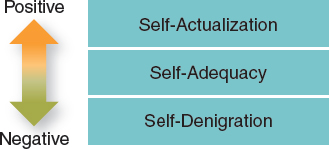
SELF-DENIGRATING BEHAVIORS can only hurt your performance, so the next time you feel like saying to yourself “I’ll never be able to understand calculus” instead try thinking “Let’s see if I can FIGURE this out!” Irina Zolina/Shutterstock
The most negative assessment you can make about a communication experience is self-denigration: criticizing or attacking yourself. This occurs most often when communicators overemphasize their weaknesses or shortcomings (“I knew I’d end up fumbling over my words and repeating myself—I am such a klutz!”). Most self-denigration is unnecessary and unwarranted. Even more important, it prevents real improvement. Hunter, for example, thinks that his sister is stubborn and judgmental and that he cannot talk to her. He says, “I always lose it with her, and I yell at her because there is nothing I can say that she will listen to!” Rather than just accepting the idea that nothing he says will ever “work,” Hunter needs to assess his communication behaviors more reasonably: what specific words and nonverbal behaviors (like eye rolling) might he have used with his sister when she “didn’t listen”? What were some different communication behaviors he used during times when he actually had positive interactions with his sister? Hunter can also plan for communication improvement (“Next time, I will not raise my voice, and I will look at and listen to my sister until she is finished talking, before I say anything back to her”). Thus, our assessments of our competence run from self-actualization on the positive end of the spectrum to self-denigration on the negative end (see Figure 2.4).



